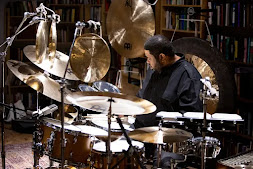Critics and reviewers were quite surprised and, ultimately, very pleased last July when drummer, composer, and conceptualist Tyshawn Sorey issued "Mesmerism" (Yeros7 Music––now reissued on Pi Recordings)), a piano trio album of four "standards" plus one piece each by Muhal Richard Abrams and Paul Motian. Sorey had wanted to include pianist Aaron Diehl (Cecile McLorin Salvant) in a project plus long-time friend and collaborator, bassist Matt Brewer (SF Jazz Collective, Ambrose Akinmusire); this project was the exact right. Later in 2022, Pi Recordings released "The Off Off Broadway Guide to Synergism", also a Trio album but with Russell Hall on bass and guest Greg Osby on alto saxophone. That triple (!) album is a must-listen.
Back to the Trio format on the new Pi Recordings album, "Continuing". Bassist Brewer has returned so one should consider this to be the official follow-up to "Mesmerism". The program consists of four tunes, one each by Wayne Shorter, Ahmad Jamal, and Harold Mabern (who had been a mentor to Sorey) plus the 1946 Matt Dennis/ Earl Brent classic "Angel Eyes". The overall program reminds this listener of a smoky nightclub gig, the early morning third set, as the music is steeped in the blues and the musicians let the songs move at a leisurely pace (save for the closing cut). Listen below to Mr. Shorter's "Reincarnation Blues" which he wrote for and recorded with Art Blakey & the Jazz Messengers in 1961. Sorey, Brewer, and Diehl create a slower take than the original. The piano solos are mighty impressive especially the dazzling second one (starting around 7:30 into the 10:25 cut). Brewer's solo, earlier in the piece, rolls atop the drums displaying a handsome melodic side.
 |
| Photo: John Rogers |
"Continuing" goes out with a bang as the Trio gets funky on Harold Mabern's "In What Direction Are You Headed". Originally recorded by Lee Morgan in 1971 for what turned to be "The Last Session". By the middle of the song, one feels as if we are in midst of a church service as Brewer locks into a nine-note riff while Sorey "stomps" out the beat. They continue in their groove even as Diehl joins in on low and high notes. The pianist does reintroduce the theme right before the album makes its rousing exit.
Pour yourself a libation, turn the lights down low, and listen as if the musicians were in your living room. All in all, this Tyshawn Sorey Trio is a real knockout!!
For more information, go to https://pirecordings.com/albums/continuing/. To hear more and to purchase the album, go to https://tyshawn-sorey.bandcamp.com/album/continuing.
Here's the opening track:
On "Synchronocity" An Interpretation of the Album by The Police" (Outer Marker Records), the Brothers play all the songs (even the cassette-only––those were the days––"bonus track") in the order they appear on the original Police Lp. Because the majority of the original songs have such strong melodies (at least, the ones composed by bassist/ vocalist Sting do), the Trio do not try re-invent the (musical) wheel. Therefore, the excitement of the opening title track is evident here as well thanks to the powerful rhythms they create. Geoff's bass is the lead instrument on the "Walking In Your Footsteps" and "Every Breath You Take"––the piano solo on the former tune has a tinge of the late Vince Guaraldi's sound while the latter builds dramatically from the opening until the bass reclaims the theme in the middle.
Jazz artists, since the beginning of its move into the public eyes and ears, like to perform the popular music of the day. Each generation of musicians looks to "pop music" to attract an audience and as a way to get those people to also listen to their original music. This is a concept that works well in the piano trio format. For its 2017 debut, the Hazelrigg Brothers, pianist George and bassist Geoff, whose main gig is designing, development, and manufacturing of high-end recording equipment, recorded "Songs We Like", a nine-song album of tunes they grew up listening to including the Police's "Spirits In the Material World". It should not come as a surprise that for their second Trio album (John O'Reilly, Jr is the drummer) that they would opt to record the entirety of the Police's 1983 "Synchronicity", that trio's fifth and final album. That recording spawned several Top 10 hits including "King of Pain", "Wrapped Around Your Finger", and "Every Breath You Take".
Some may argue that the Hazelrigg Brothers trio don't take many chances on their reinterpretation of The Police "Synchronicity" but, to their credit, they make Andy Summer's song "Mother" much more interesting replacing its manic vocal lines and by emphasizing the Kurt Weill aspects in the instrumental. Overall, if you grew up with this music, you should enjoy this album. If you are new to the material, enjoy the songs with the finely-etched melody lines and the excellent musicianship that abounds on this heartfelt tribute.
For more information, go to www.outermarkerrecords.com/cdvinyl/p/hazelrigg-brothers-synchronicity.
Here's a version of "Miss Gradenko" from 2015:









No comments:
Post a Comment